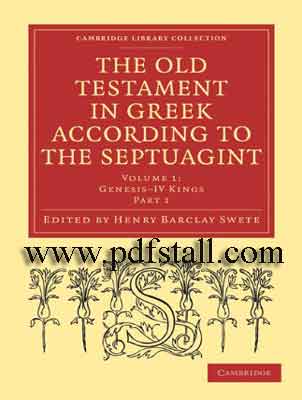
Book Title: The Old Testament in Greek
Author(s): Henry Barclay Swete
Series: Cambridge Library Collection – Religion
Publisher: Cambridge University Press, Year: 2010
Category: Religious
ISBN: 9781108007283,1108007287
Description:
The Old Testament, also known as the Hebrew Bible, is a collection of religious texts that are considered sacred by Jews and Christians. However, for many centuries, the Old Testament was translated into Greek, and the translation became known as the Septuagint. This article will examine the significance of the Septuagint and its impact on the interpretation of the Old Testament.
The Septuagint, or LXX for short, was translated into Greek between the 3rd and 1st centuries BCE. It is believed to have been commissioned by the Jewish community in Alexandria, Egypt, who wanted a translation of the Hebrew scriptures into Greek, the dominant language of the time. The Septuagint quickly became the preferred version of the Old Testament for the early Christian church, as well as for Greek-speaking Jews.
One of the most significant aspects of the Septuagint is that it provided a translation of the Old Testament that was accessible to the non-Jewish world. The Greek language was widely spoken, and the Septuagint allowed the message of the Old Testament to reach a wider audience. This was particularly important for the early Christian church, which was trying to spread the message of Jesus to non-Jewish communities. The Septuagint also provided a means for early Christians to understand the Old Testament in terms of their own experiences and cultural background.
Another significant aspect of the Septuagint is its impact on the interpretation of the Old Testament. The Septuagint was not just a straightforward translation of the Hebrew text, but also included interpretive elements. For example, the Septuagint sometimes added to or expanded upon the original Hebrew text, and it also sometimes reinterpreted passages in light of contemporary ideas and beliefs. This interpretive aspect of the Septuagint has had a lasting impact on the way that the Old Testament has been understood and interpreted.
The Septuagint also had a significant impact on the development of the New Testament. Many of the quotes from the Old Testament that are found in the New Testament come from the Septuagint, rather than from the original Hebrew text. This is because the Septuagint was the version of the Old Testament that was most widely used and most familiar to the early Christian community. The Septuagint also influenced the way that the early Christians interpreted the Old Testament and its relationship to Jesus.
Despite its significant impact, the Septuagint is not without its controversies and challenges. Some scholars argue that the Septuagint represents a departure from the original intent of the Old Testament, and that its interpretive elements sometimes distorted the meaning of the text. Others argue that the Septuagint was a necessary step in the transmission and interpretation of the Old Testament, and that its interpretive elements provide valuable insight into the beliefs and experiences of the early Christian and Jewish communities.
In conclusion, the Septuagint, or the Greek translation of the Old Testament, has had a lasting impact on the way that the Old Testament has been understood and interpreted. It provided a means for the non-Jewish world to access the message of the Old Testament, and it also influenced the development of the New Testament. Despite its controversies, the Septuagint remains an important source for scholars and students of the Old Testament and its history.
In conclusion, the Septuagint is a crucial part of the history of the Old Testament, and it continues to have a lasting impact on our understanding of this important collection of religious texts. Whether one views the Septuagint as a departure from the original intent of the Old Testament or as a valuable interpretive tool, there is no denying the significance of this Greek translation in the history of the Old Testament and